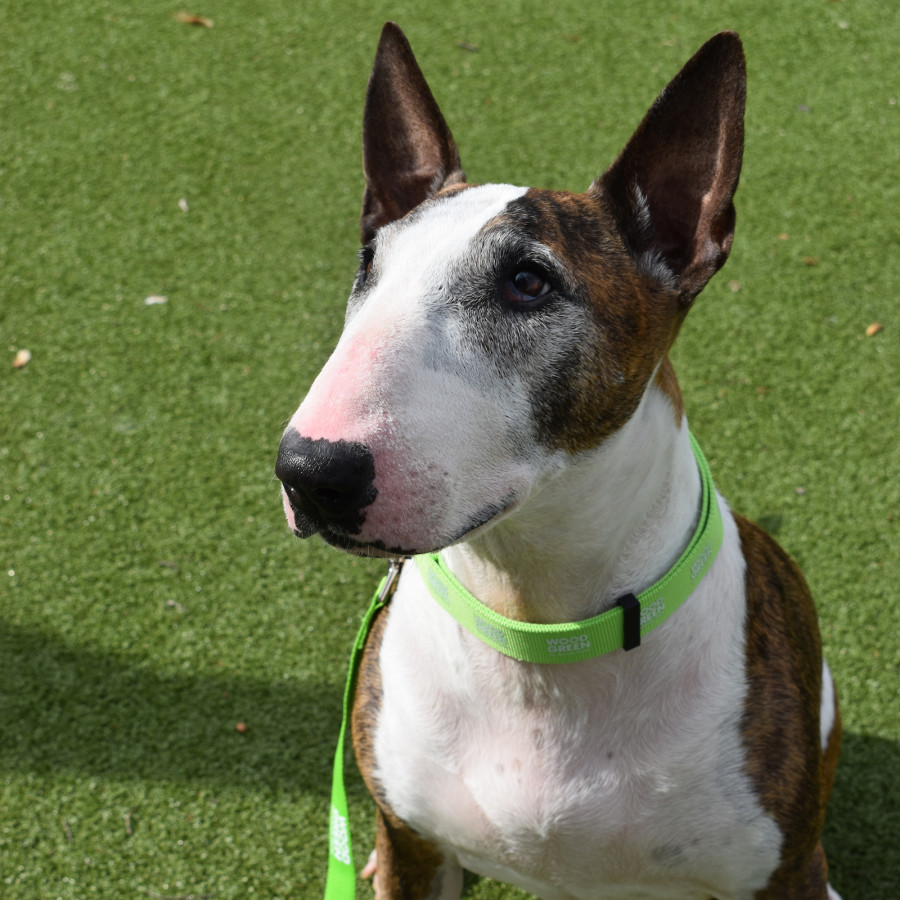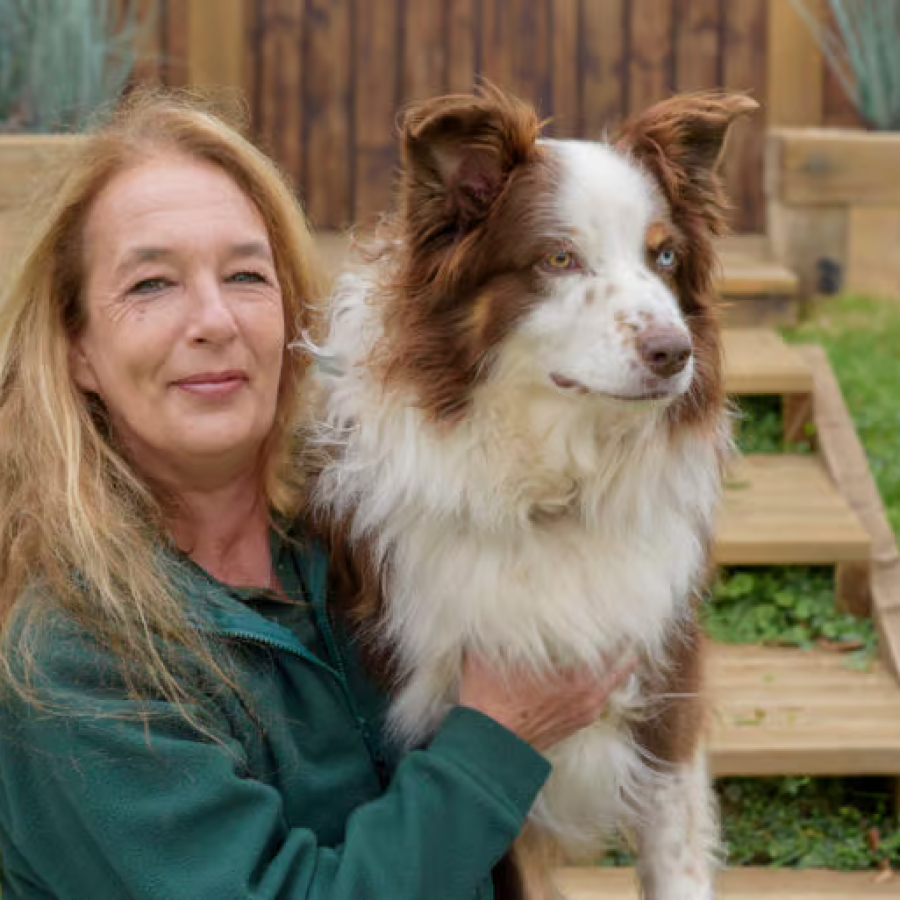
Bull Terrier Dog Breed
Bull Terriers are loveable, playful and strong, like a bull in a China shop!

Bull Terriers are loveable, playful and strong, like a bull in a China shop!
Breeds like this may have extreme body conformation, which means exaggerated body features, or a flat face and shorter nose (brachycephalic). These characteristics can negatively affect their health and welfare, and you may face higher insurance and veterinary costs.
If you have your heart set on this breed, please consider rescuing a dog in need rather than buying a puppy.
If you’re looking for a comedic companion with striking looks and a larger-than-life personality - look no further than a Bull Terrier. These dogs are great for active families, but they’re strong enough to knock over young children. The standard Bull Terrier weighs 22-31kg and the mini weighs between 11 to 15kg.
Bull Terriers are courageous, determined and rumbunctious. They’re loving and loyal towards their family and have a high chase instinct. If they’re not introduced to dogs at a young age, they’re unlikely to get along with others.
A highly energetic breed, Bull Terriers are known to cause a huge amount of chaos in a short time, while having fun about it, sporting a huge grin on their face. They do have slightly higher needs than other breeds, but once you’ve shared your life with a Bull Terrier, you’ll be forever smitten!
Disclaimer
While these breed traits give a general idea of what to expect from a specific type of dog, it's important to remember that every dog is unique. Just like people, each dog comes with their own distinct personality, quirks, and characteristics!

This breed is incredibly affectionate towards people, they just want to be with you all the time and get up in your personal space. They don’t give gentle snuggles, they put the same strength and enthusiasm into everything they do. Once you have spent the evening chilling on the sofa with a Bull Terrier, you will realise few breeds offer such an experience!
Bull Terriers are very playful if you also consider the games they like to be fun for you too! They enjoy tug-of-war and often they want to play wrestling games. They’re not known to play a nice game of ‘fetch’ in the garden.
We consider these to be ‘competition style games’, so it’s best to encourage manners and self-control from a young age.
Bull Terriers suit an active family where they can be involved in everything you do. They can struggle if they’re left alone for long periods, resulting in destructive and mischievous behaviour out of boredom.
So long as they get enough exercise, Bull Terriers can adapt to most living arrangements, their big personalities and strength can make them feel bigger than they are, so make sure there is space on the sofa for them!
Bull Terriers sometimes struggle to live with other animals, including those of the small, furry variety due to their strong hunting instincts.
Bull Terriers will thrive with about an hour of exercise a day, they’re an active breed and love a good run off-lead. So, it’s worth researching secure dog fields to hire to allow your dog to burn off their energy.
They also enjoy exploring new places, sniffing in the woods or mooching around a town centre.
Bull Terriers are naturally curious and intelligent, so they need to exercise their minds as well as their body. Searching for food, feeding puzzles and basic training can satisfy their need for mental stimulation.
A cosy jacket is a must for the cold winter months as well as a waterproof jacket for wet weather, Bull Terriers can be very sensitive to poor weather.
All puppies need to learn how to be around people, pets, and other dogs, calmly and politely (known as socialisation). They also need help to feel calm, comfortable, and confident in everyday situations like travelling, the sound of traffic, and being in busy places (known as habituation). This is essential to prevent tricky behavioural problems in the future, and you'll be off to a great start with your ongoing training.
Bull Terriers are highly intelligent dogs, they respond well to positive training methods, reinforced by their favourite toys and food.
This breed in particular finds it really challenging to come to you when their name is called, so take time to build this skill from scratch and use a long line until they can reliably do this.
If you have a Bull Terrier puppy, attending a puppy class is a must! The sooner the better to minimise challenges later. If you have an adult dog, it’s not too late, you will just need to have lots of patience and a good sense of humour!
Calling upon a professional for support will help you work through training challenges.
As a short-haired breed, grooming needs for a Bull Terrier are minimal. They do enjoy the sensation of a gentle groom with a semi-stiff brush though. For a dog with such short hair, they do shed quite a lot of it, so you may find those little white hairs everywhere.
Bull Terriers are known to suffer from heart and kidney problems, but a good breeder will screen their dogs for these issues before breeding. White Bull Terriers are often deaf, and breeders can test their puppy’s hearing at around five weeks old.
As a naturally robust dog, this breed can be prone to weight gain. This should be monitored to keep their joints as healthy as possible as luxating patella (a condition where the kneecap dislocates), osteoarthritis (a common condition that affects the joints, causing pain, stiffness and problems moving) and cruciate damage (damage to one or both knees) are all known in the breed. Keeping your Bull Terrier fit, and lean will ensure they can keep active into old age.
Neurological disorders are also present in the breed. Epilepsy and some compulsive behaviour disorders have been reported.
I only require an average amount of exercise a day, a chance for me to have a run. I like other activities to keep me busy and out of mischief.
I’m pretty smart and an excellent problem-solver. I enjoy food puzzles and destroying boxes. If you give me plenty to do, I’ll happily relax with you later.
I need help to control my hunting instincts, so it may take me some time to learn to come to you when you call my name.
A Bull Terrier puppy costs anywhere from £1,000 to £2,500. Pet insurance is a must, but the cost will depend on the type of cover you go for.
It’s not incredibly expensive to feed your Bull Terrier, but the initial set-up costs to prepare for your new four-legged housemate may set you back between £800 and £1,000.
Routine healthcare such as preventative medicine, neutering, dental care, training classes and other expenses such as boarding when you go on holiday are costs that all need to be considered in your budget.
Take our quiz to discover which breed is right for you
Take our quizPlease call our pet support line on 0300 303 9333 (7 days a week – 8.30am - 4pm)